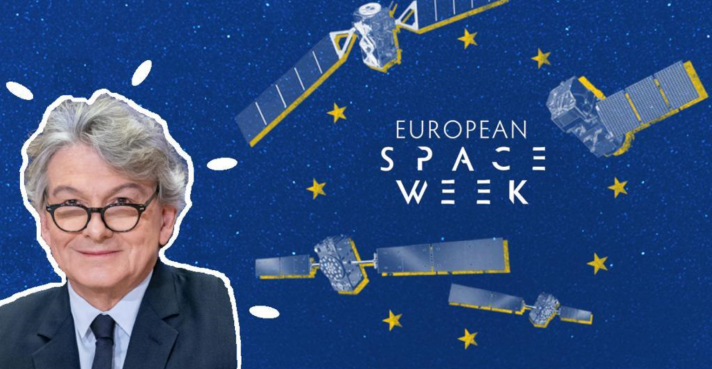Archived content
This website is no longer being updated. The content may be out-of-date and should be consulted for past reference only.
To find information about the College of Commissioners for the term 2024-2029, go to the Commission’s main website
This website is no longer being updated. The content may be out-of-date and should be consulted for past reference only.
The space landscape is changing fast.
The cost of “doing space” is decreasing as competition is evolving. Innovation cycles are shortening.
New private actors are emerging - bringing with them new concepts, new business models and disruptive technologies.
The European space actors - industry, space agencies, and governments - have to adapt to this new reality.
To support them, the European Commission has secured a historic budget for space with €13 billion for the 7 years to come.
Develop our space flagships
First, this budget will be essential to operate and develop further our space flagships.
Galileo, the European global satellite-based navigation system, and Copernicus, European Union's Earth observation programme, already deliver world-class services. We need to maintain our technological edge.
Therefore, we will invest on new Copernicus missions to provide with the most accurate data from Planet Earth 24/7.
Next generation Galileo will be more resilient, more accurate and flexible enough to keep pace dynamically with evolving innovation.
Secure connectivity and quantum encryption
We will position Europe at the forefront of setting standards for space traffic management. Thanks to the Space Surveillance and Tracking framework, which protects already 148 European satellites from collision, we have strong building blocks to be ambitious.
Europe also needs to position fast on a Secure Connectivity initiative. We cannot afford to be dependent on emerging connectivity constellations that are non-Europeans.
Low earth orbit constellations will allow Europe to benefit from a space-based high-speed connectivity everywhere, complementary to other technologies (fibre and 5G).
It would also project Europe into the quantum encryption area, certainly the most important technological breakthrough to come.
Since such projects are at the intersection of digital and space - computing power and data - it is crucial to encourage the space industry to further connect with digital companies and telecoms.
A European Way for New Space
The future of the European space industry will be a combination of strong institutional leadership and a European approach to New Space.
Because now is the time to seek alternative business models and funding schemes, through a new space entrepreneurship Initiative: “CASSINI”, which will regroup services such as acceleration, business incubation, seed-funding and pre-commercial procurement.
More EU start-ups and SMEs will be able to raise space investment in the next seven years thanks to the €1 billion of the European Space Fund.
An autonomous access to space strategy
There is no space policy without a clear and coordinated autonomous access to space strategy for Europe.
Europe can rely on Ariane 6 and Vega C as the next generation of launchers. They are central to answering the global demand.
Looking beyond, Europe also needs to project itself towards a new generation of launchers to ensure its leadership in the next 10years. As the first institutional customers of European launchers, the European Commission will aggregate the launching services.
The transformation of European space has begun.
To remain the world’s second space power- we need a vision, an ambitious budget, successful programmes, and a strong and dynamic EU space industry with innovative SMEs and start-ups.
Together and coordinated we know we will be stronger and thrive in the decades to come.
Details
- Publication date
- 9 December 2020
- Author
- Directorate-General for Communication

